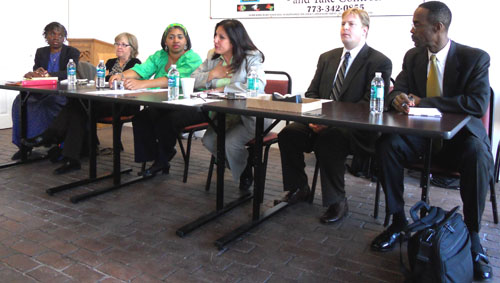General Assembly finally approves Chicago Facilities Legislation, despite Emanuel's opposition
At the end of its session, the Illinois General Assembly has finally passed the Chicago school facilities legislation, more than two years after the legislation was first proposed by State Rep. Cynthia Soto as a method of stopping the Chicago Board of Education from doing its facilities planning behind closed doors and without public participation.
 Members of the Illinois Facilities Task Force held hearings across Chicago during the past year on problems facing the public schools when facilities decisions were being made. At the January 14, 2011 hearing on Division Street in Chicago, members of the task force flanked chair Rep. Cynthia Soto (above, fourth from left) as the hearing began. Substance photo by George N. Schmidt. Senate Bill 620 ŌĆö legislation to ensure new procedures for CPSŌĆÖs management of school buildings and improvements as well as new a process for school actions (including the controversial school closings, consolidations, phase outs, and "turnarounds" ŌĆö passed the Illinois House of Representatives unanimously on May 31. The Senate concurred by a vote of 58 ŌĆ£YeasŌĆØ and only one ŌĆ£NoŌĆØ vote. The Chicago Educational Facilities Taskforce (CEFTF) ŌĆö a General Assembly- initiated taskforce of community groups, educators and lawmakers, charged to create recommendations to address facility and school action controversies that have arisen over the past decade ŌĆö worked for over a year to create the recommendations outlined in the legislation.
Members of the Illinois Facilities Task Force held hearings across Chicago during the past year on problems facing the public schools when facilities decisions were being made. At the January 14, 2011 hearing on Division Street in Chicago, members of the task force flanked chair Rep. Cynthia Soto (above, fourth from left) as the hearing began. Substance photo by George N. Schmidt. Senate Bill 620 ŌĆö legislation to ensure new procedures for CPSŌĆÖs management of school buildings and improvements as well as new a process for school actions (including the controversial school closings, consolidations, phase outs, and "turnarounds" ŌĆö passed the Illinois House of Representatives unanimously on May 31. The Senate concurred by a vote of 58 ŌĆ£YeasŌĆØ and only one ŌĆ£NoŌĆØ vote. The Chicago Educational Facilities Taskforce (CEFTF) ŌĆö a General Assembly- initiated taskforce of community groups, educators and lawmakers, charged to create recommendations to address facility and school action controversies that have arisen over the past decade ŌĆö worked for over a year to create the recommendations outlined in the legislation.
The new legislation will address the following issues:
CPS must create a 10-Year Facility Master Plan by 2013 ŌĆö with extensive community input, and coordination with other local governments and your elected officials, including LSCs.
CPS must release a detailed annual capital budget and five-Year Capital Plan every year, and produce an end-of-year Capital Expenditure Report. This will enable the public and elected officials to "follow the money.ŌĆØ
School Actions (such as closings, consolidations, phase-outs, and turnarounds) have to be announced by CPS every year by December 1st with a written explanation for the proposed action.
CPS must have a transition plan to support and aid students and schools impacted if/when school actions are approved by the CPS.
The CEFTF will oversee that CPS abide by the new rules, which put students, educators, and the community first, according to supporters if the legislation. The legislation was opposed by representatives of Mayor Rahm Emanuel, who tried to argue that it would tie his hands during the opening months or the Emanuel administration.
Ignored during most of the discussion about the need for the legislation was the fact that Chicago developed an annual facilities plan for more than ten years during the 1990s and early 2000s. As late as 2005, Chicago Public Schools held facilities hearings at six locations across the city, getting input from more than 50 schools. Only when Renaissance 2010 (and its dramatic closing, consolidation, phase out, and turnaround plans) escalated in the mid-2000s did Chicago's school board simply ignore any decency in its facilities planning. By 2009, CPS was announcing plans that resulted in major changes in communities across the city as part of the agenda made public two days prior to the Board of Education meetings.

